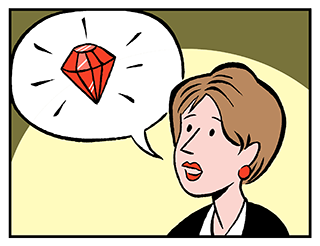Glittering Generalities

Just as name-calling words can be used to make a good idea seem bad, glittering generalities are used to make a bad idea seem good.
Patriotism. Justice. Truth. Hero. Science. Freedom.
These are all glittering generalities. These words sound great, but they mean different things to different people.
For example, consider the word democracy. This is a good word; an important word. But what does it mean? When somebody uses this word in conversation, we fall back on our personal understanding of the term, relying on ideas we learned from our parents, our teachers, our neighbors and our friends. We assume that the other person interprets the term in the same way that we do.
As the IPA explains, this “lowers our sales resistance and makes us far less suspicious than we ought to be when the speaker begins telling us things ‘the United States must do to preserve democracy.'”
Alert readers will recognize that glittering generalities are the mirror image of name-calling words. One technique encourages us to reject ideas or people without considering the evidence; the other hopes we will approve of ideas or people without considering the evidence.
These feel-good words regularly surface in commercial taglines and political slogans. For example:
- The Best A Man Can Get (Gillette Razors)
- Think Different (Apple Computer)
- Turn Your Coffee from Plain to Perfect (Coffee-Mate)
- Feed The Good (Pedigree Dog Food)
- A Safer World and More Hopeful America (George W. Bush & Dick Cheney, 2004)
- A Stronger America (John Kerry & John Edwards, 2004)
- Prosperity and Progress (Al Gore & Joe Lieberman, 2000)
- Reform, Prosperity, and Peace (John McCain & Sarah Palin, 2008)
One also encounters glittering generalities in the names of political action committees and lobbying groups on all sides of the political spectrum. For example:
- Center for American Progress
- Restore Our Future
- Indian Americans for Freedom
- Vets for Freedom
- Young Americans for Freedom
- Americans for Medical Progress
What’s wrong with peace, progress, prosperity, and freedom, you might be wondering? Aren’t these all good things?
Absolutely! Peace, prosperity and progress are complicated concepts that mean different things to different people.
Propagandists don’t want us focusing on specific details. They hope to see us bathing in these words’ positive emotional glow.
It is also important to consider a close cousin of the glittering generality: the superlative. Superlatives are adjectives used to describe something of the very highest quality. Words like amazing, beautiful, best, fabulous, phenomenal, strong, and tremendous are all such words. But what do these words really mean in the context of the speaker’s claims? What, specifically, makes the speaker’s idea so tremendous?
As with the glittering generalities, the propagandist who relies on these words has no interest in fleshing out their definition. She cares only about the positive emotional feelings these words are intended to arouse.
The Institute for Propaganda Analysis suggests a number of questions that people should ask themselves when confronted with this technique:
- What does the virtue word really mean?
- Does the idea in question have a legitimate connection with the real meaning of the word?
- Is an idea that does not serve my best interests being “sold” to me merely through its being given a name that I like?
- Leaving the virtue word out of consideration, what are the merits of the idea itself?
